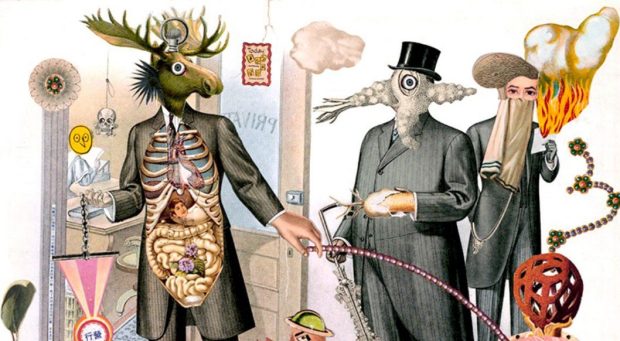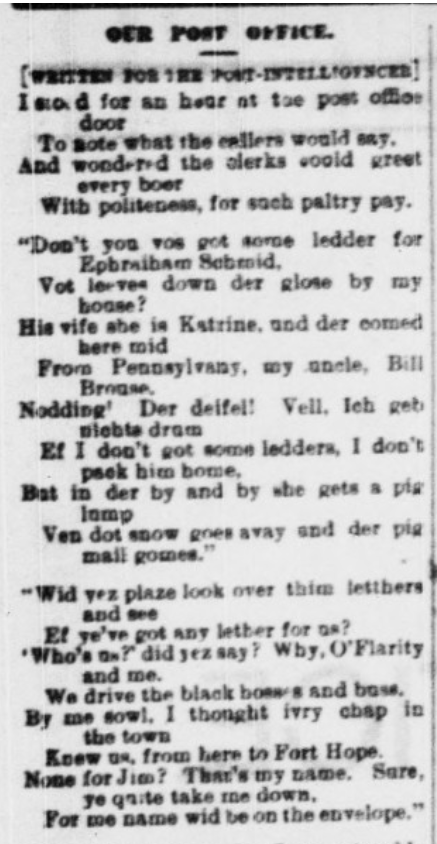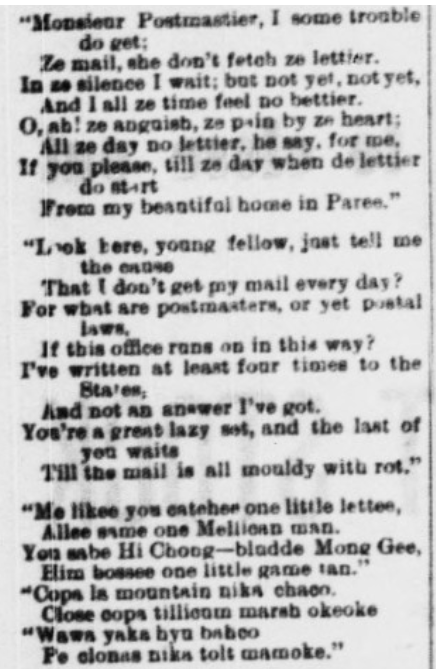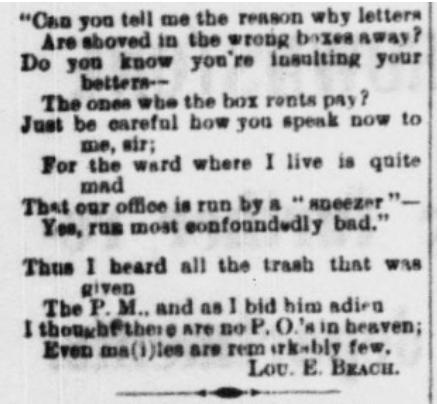1885, WA: “Our Post Office” doggerel
With a couple of characters speaking mixed Chinook Jargon & Chinese Pidgin English, none of it translated, thus probably lifelike.
However, fair warning, both pidgin languages, like everything else here, rhyme.
So that’s going to cut into their grammatical accuracy and/or our ability to figure out what they say!

Not Lou E. Beach, but artist Lou Beach, whose stuff you can see in Seattle galleries
(image credit: Not Real Art)
Another issue is that the image I found of this particular newspaper page is low-quality. There are a number of things here that I may have misread.
This poem was written late enough in the frontier era that it’s about Seattle already being a big city, with a melting pot of an immigrant mix. (German, Irish, French albeit oddly from France instead of Canada.) So we have the unusual experience here of finding Chinese and Indigenous people treated as just a couple more ethnicities, rather than as intrinsic parts of the western landscape.
One last though before we read our dose of doggerel — funny how the only apparently non-White characters have to split a stanza between them. The White folks each get plenty of speaking time…
I’ll offer a translation of the Chinuk Wawa after you take in this work of art:



OUR POST OFFICE.
[WRITTEN FOR THE POST-INTELLIGENCER.]I stood for an hour at the post office
door
To note what the callers would say,
And wondered the clerks could greet
every boer
With politeness, for such paltry pay.“Don’t you vos got some ledder for
Epbraiham Schmid,
Vot leeves down der glose by my
house?
His vife she is Katrine, and der comed
here mid
From Pennsylvany, my uncle, Bill
Brouse.
Nodding! Der deifel! Vell, Ich geb
nichts drum
Ef I don’t got some ledders, I don’t
pack him home,
But in der by and by she gets a pig
lump
Ven dot snow goes avay and der pig
mail gomes.”“Wid yez plaze look over thim letthers
and see
Ef ye’ve got any lether for as?
‘Who’s us?’ did yez say? Why, O’Flarity
and me.
We drive the black bosses and buss.
By me sowl, I thought ivry chap in
the town
Knew us, from here to Fort Hope.
None for Jim? That’s my name. Sure,
ye quite take me down,
For me name wid be on the envelope.”“Monsieur Postmastier, I some trouble
do get:
Ze mail, she don’t fetch ze lettier.
In ze silence I wait; but not yet, not yet,
And I all ze time feel no bettier.
O, ah! ze anguish, ze pain by ze heart;
All ze day no lettier, he say, for me.
If you please, till ze day when de lettier
do start
From my beautiful home in Paree.”“Look here, young fellow, just tell me
the cause
That I don’t get my mail every day?
For what are postmasters, or yet postal
laws.
If this office runs on in this way?
I’ve written at least four times to the
States,
And not an answer I’ve got.
You’re a great lazy set, and the last of
you waits
Till the mail is all mouldy with rot.”“Me likee you catchee one little lettee,
Allee same one Mellican man.
You sabe Hi Chong — bludde Mong Gee,
Him bossee one little game tan.”
“Copa Ia mountain nika chaco.
Close copa tillicum marsh okeoke
“Wawa yaka hyu bahco
Pe clonas nika tolt mamoke.”“Can you tell me the reason why letters
Are shoved in the wrong boxes away?
Do you know you’re insulting your
betters —
The ones who the box rents pay?
Just be careful how you speak now to
me, sir;
For the ward where I live is quite
mad
That our office is run by a “sneezer” —
Yes, run most confoundedly bad.”Thus I beard all the trash that was
given
The P[ost]. M[aster]., and as I bid him adieu
I thought there are no P. O.’s in heaven;
Even ma(i)les are remarkably few.— Lou. E. BEACH.
— from the Seattle (WA) Post-Intelligencer of January 17, 1885, page 4, column 1
Translation:
“Copa Ia mountain nika chaco.
‘From the mountains I come.’
Close copa tillicum marsh okeoke
‘It’s good for a friend to send those’
“Wawa yaka hyu bahco*
‘Words that (s)he (has) lots of [to]bacco*’
Pe clonas nika tolt* mamoke.”
‘And maybe I’ll snag* some work.’
The poem’s meter kind of breaks down in this Jargon section, an implied recognition that it’s plumb hard to use Chinook this way!
